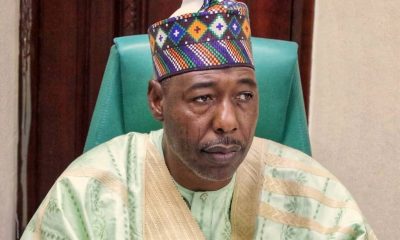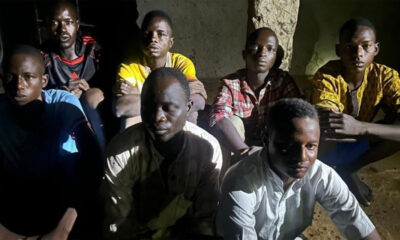Latest News
Borno gov to FG: Let’s hire mercenaries to defeat Boko Haram

Governor of Borno State, Babagana Zulum, has advised President Muhammadu Buhari to recruit mercenaries to get rid of Boko Haram insurgents from Sambisa forest.
He spoke on Monday when a Federal Government delegation visited Borno over the killing of at least 43 farmers, listing the hiring of mercenaries among recommendations to the President to stop the frequent attacks by insurgents in the state.
Those in the FG delegation are Senate President Ahmad Lawan; Ibrahim Gambari, chief of staff to the president; Babagana Monguno, national security adviser, and some ministers.
Other recommendations by the governor include provision of armed resistant armoured personnel carriers, rehabilitation of roads and support for displaced persons.
He said, “One of our recommendations as possible solutions to end the insurgency is the immediate recruitment of our youths into military and paramilitary services to complement the efforts of the Nigerian forces.”
The governor also said, “Our second recommendation is to engage the services of our immediate neighbours, especially the governments of Chad, Cameroon and Niger Republic, in clearing the remnants of Boko Haram hiding on the shores of the Lake Chad.
“Our third recommendation is for him to engage the services of the mercenaries to clear the entire Sambisa forest.
“Our fourth recommendation is for him to provide the police and the military, with armed resistant armoured personnel carriers and other related equipment.
“We are also soliciting the support of the Federal Government to support the Borno State repatriation of out displaced persons currently residing in Cameroon and Niger Republic.”
Zulum added that the Federal Ministry of Works and Housing had not constructed roads in the last 25 years “in Borno State and most parts of the North-East”.
He said if the FG could fix the bad roads in Borno and the North-East, “the insurgency would be reduced by 60 per cent”.
Lawan sympathised with the state government over the killings and assured the people that the Buhari administration was committed to ending insurgency.
He said, “No efforts will be spared”, adding that the government will do “anything and everything until we take the fight against insurgency to their enclaves”.
Latest News
Ondo, Edo, Bauchi account for 70% of lassa fever cases – NCDC

The latest report of lassa fever from the Nigeria Centre for Disease Control (NCDC) showed that as of July 24, 2022, Indo, Edo and Bauchi states contributed 70 percent of the total cases of Lassa fever in the country.
Ondo, Edo and Bauchi recorded of 30 per cent, 26 per cent, and 14 per cent respectively.
It also revealed that between July 18 and 24, new confirmed cases increased to 10 from five the previous week.
Two persons lost their lives during the period under consideration. Therefore, since the beginning of the year, the total confirmed cases of Lassa fever are 857, with 164 total deaths reported.
The NCDC said, “Cumulatively from week 1 to week 29, 2022, 164 deaths have been reported with a Case Fatality Rate (CFR) of 19.1 percent, which is lower than the CFR for the same period in 2021 (23.7 percent).
“In total for 2022, 24 states have recorded at least one confirmed case across 99 Local Government Areas.
“Of all confirmed cases, 70 percent are from Ondo (30 percent), Edo (26 percent), and Bauchi (14 percent) states. The predominant age group affected is 21-30 years (Range: 0 to 90 years, median age: 30 years). The male-to-female ratio for confirmed cases is 1:0.8.
“The number of suspected cases has increased compared to that reported for the same period in 2021. One new Healthcare worker affected in Ondo State.
“National Lassa fever multi-partner, multi-sectoral Technical Working Group (TWG) continues to coordinate the response activities at all levels.”
To reduce the risk of the spread of Lassa fever, the NCDC offers the following advice: Ensure proper environmental sanitation – that is, keep your environment clean at all times, block all holes in your house to prevent rats from entering; Cover your dustbins and dispose of refuse properly. Communities should set up dumpsites very far from their homes to reduce the chances of having rodents within homes; Store foodstuff like rice, garri, beans, corn/maize, etc in containers that are well covered with tight-fitting lids.
Others are – Avoid drying foodstuffs outside on the floor, roadside where they will be exposed to contamination; Avoid bush burning which can lead to the displacement of rats from bushes to human dwellings; Eliminate rats in homes and communities by setting rat traps and other means; Practice good personal hygiene by frequent washing hands with soap under running water or use of hand sanitisers when appropriate, and visit the nearest health facility if you notice any of the signs and symptoms of Lassa fever as mentioned earlier, and avoid self-medication.
Latest News
Insecurity: FG urged to seek foreign help

The Federal Government of Nigeria has been advised to seek foreign help urgently in order to tackle the problems of insecurity in the country.
According to a statement by a renowned socio-political activist and critic, Chief Adesunbo Onitiri, this became very imperative to enable Nigerians to live in peace.
He also called on the government to declare a state of emergency on insecurity in order to tackle the problem with all the seriousness it deserved.
Onitiri said the only option left was to urgently seek foreign assistance.
“We wake up daily to hear news of our youths, women, and citizens being raped, kidnapped, maimed, and killed.
“While the country is in a state of war with the bandits, our students are out of school for over five months. All our higher institutions are under lock and key. This is unacceptable to Nigerians,” Onitiri lamented.
Onitiri explained that the Kuje Prison and the Kaduna military formations attacks were sour in the mouth. “It’s like our sovereignty as a nation has been eroded.”
Latest News
164 Die Of Lassa Fever As Cases Jump To 857

THE Lassa fever cases in Nigeria have jumped to 857 and 164 people have so far died from the disease in the first seven months of 2022.
The Nigeria Centre for Disease Control (NCDC) said this in its latest Lassa fever situation report for week 29, which showed that there were 857 confirmed cases of the disease in the country.
The NCDC said that the cases were distributed across 24 states and 99 local government areas in the country.
It said that 54 healthcare workers had been infected with the disease.
“A breakdown indicated that of all confirmed cases, Ondo has 30 per cent Edo, 26 per cent and Bauchi 14 per cent states.
“In week 29, the number of new confirmed cases increased from five in week 28, 2022 to cases. These were reported from Edo and Ondo States.
“Cumulatively from week 1 to week 29, 2022, 164 deaths have been reported with a case fatality rate (CFR) of 19.1 per cent which is lower than the CFR for the same period in 2021, 23.7 per cent.
“In total for 2022, 24 States have recorded at least one confirmed case across 99 Local Government Areas. Of all confirmed cases, 70 per cent are from Ondo, 30 per cent Edo 26 per cent and Bauchi 14 per cent cases.
“The predominant age group affected is 21-30 years range: 0 to 90 years, Median Age:30 years. The male-to-female ratio for confirmed cases is 1:0.8.
“The number of suspected cases has increased compared to that reported for the same period in 2021. One new healthcare worker was affected in Ondo State,” it said.
The News Agency of Nigeria (NAN) reported that Lassa fever is a viral hemorrhagic fever transmitted by rats.
It has been known since the 1950s, but the virus was not identified until 1969 when two missionary nurses died from it in the town of Lassa in Nigeria.
Even after recovery, the virus remains in body fluids, including semen. Neighbouring countries are also at risk, as the animal vector for the Lassa virus, the “multimammate rat” (Mastomys natalensis) is distributed throughout the region.
-

 News2 days ago
News2 days agoFIRS announces recruitment of young graduates
-

 metro3 days ago
metro3 days agoUpdated: Army says reports of COAS Lagbaja’s death fake news
-

 metro2 days ago
metro2 days agoOluwo chased me out when I visited him – Ooni (VIDEO)
-

 News2 days ago
News2 days agoOsinbajo traitor, can’t talk about integrity – Reno Omokri
-

 metro2 days ago
metro2 days agoFani-Kayode: How my aide died in hotel after attending church
-

 Business1 day ago
Business1 day agoWe’re settling out of court with NNPC, others — Dangote
-

 metro2 days ago
metro2 days agoBREAKING : DSS replaces Tinubu’s chief security officer
-

 News2 days ago
News2 days agoYou can’t overrule Supreme Court on LG autonomy – Klinsmann tells Soludo















You must be logged in to post a comment Login